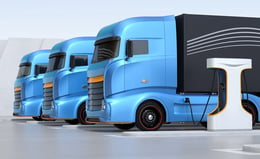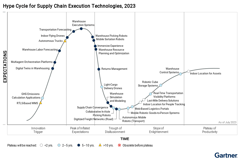The Best Route to Leaner Greener Transport
Keith LaBotz - April 21, 2022

Transportation optimization presents the greatest potential and barrier for supply chain sustainability, and a recent breakthrough created a new path forward.
Freight transport accounts for 29% of GHG emissions, and with record-high fuel prices burning up profits, it’s a top priority for supply chains. The IEA projects an optimistic path to net-zero CO2 emissions for various transportation modes as shown below. Assuming profitability doesn’t follow the same downward slope, breakthrough technologies will be needed.
The transportation industry depends on oil for 92% of its energy use. Without economically viable alternatives, optimizing existing transportation networks offers the biggest opportunity for CO2 reduction. However, there are big obstacles blocking this path:
- Supply chain sustainability is uncharted territory.
- Transportation is the most dynamic, fragmented activity in a supply chain.
- Transportation is the core of every supply chain, and it’s mission-critical. There’s no room for risky projects.
- There is no control over the processes used by third parties involved in the transportation process.
- Complete optimization requires integrating all modes of transportation for inbound and outbound freight. This includes the shipping activities of all corporate distribution sites, third-party logistics providers and intermediaries like digital freight markets, and suppliers in a supply chain.
Knowing how and where to begin is difficult. A previous post compared the journey to cutting a path through the jungle, and it offered a tip for identifying the best route forward: embed emissions functionality into transportation planning and execution. That’s what a new solution from flexis and BigMile does to make transportation optimization easier at every step.
A Breakthrough Solution
flexis partnered with BigMile and created a solution that’s nothing short of a breakthrough. It provides a simple, straightforward approach to reducing transport-related emissions and costs by optimizing transportation across a supply chain. Data insights are not merely made visible but are actualized by flexis software during planning and execution. Equally important, it keeps sustainability progressing on the best route to a leaner, greener supply chain.
Meet Tobias from BigMile
I chatted with Tobias Haessler, Managing Director of BigMile Germany, to learn how BigMile enhances transportation optimization in flexis’ planning and execution solutions. With 15 years of logistics optimization experience before BigMile, Tobias has an in-depth understanding of sustainable transportation. The following excerpts from our discussion should interest any company desiring more sustainable transportation.
What does BigMile do, and what is the value proposition?
Tobias: The main idea is to bring visibility to emissions from transportation for all modalities in all parts of the supply chain. We make this visible for decision-making so companies can see opportunities and take action to improve their carbon footprint.
You have BigMile as a platform to connect all your suppliers and transport companies. We collect the shipment data to calculate a reliable carbon footprint and analyze it in deep-dive mode. And the question is: what actions can you take to improve this footprint?
This is the main focus of our company, to optimize transportation decisions, so they minimize emissions. Is it the supply chain network or the vehicle routing that must be improved?
Optimization is the key to improving carbon emissions, and with our API, we integrate this knowledge into the flexis algorithm. It's not just about calculating emissions after the fact; it's about using this information when optimizing delivery routes so a company can meet its sustainability goals. This is unique.
We don't know of any provider of logistics optimization software who is doing that. Everybody else is talking about it, that it’s on the roadmap - we are the first to integrate sustainability into the transportation planning process and vehicle routing optimization.
How does BigMile make it easier for companies to report emissions?
Tobias: As a shipper, you have pressure from all sides to report carbon emissions. In Europe, we don’t have one standard for calculating emissions; there are multiple standards. There is the GLEC standard, it's an international thing, and in the US, there is SmartWays. Different countries have different reporting requirements. Our value proposition is to be a platform that supports all of these frameworks.
Our platform also provides data sharing functions because you cannot do a carbon footprint across the entire supply chain without sharing data. We capture data from all parties associated with a shipment to track its complete emissions history. It's really important to be transparent and build trust in this kind of community so supply chains can integrate all participants. This sort of data sharing across the supply chain is also unique.
Another interesting problem for companies right now is the challenge of incorporating CO2 information into financial accounting. It' an upcoming regulatiom for companies to report CO2 with end-of year financial statements, and their data management and reporting methodologies must be reliable and traceable.
An accounting firm must audit the reporting process. We have an ISAE 3000 (International Standard of Assurance Engagements) certification, so accountants don't have to audit the internal operations of BigMile customers. They also avoid the expense of upgrading their systems to pass these audits.
With BigMile, companies only need to submit accurate data and then trust the magic we do behind the scenes. We make it easy to file CO2 emissions with annual financial reports without any additional verifications.
What solutions do you see next from BigMile for sustainable transportation?
Tobias: We are working on functionality to advise a company on what it can do to improve its carbon footprint. Today we provide a complete, transparent accounting of emissions.
In the future, the process will become smarter with an AI-based approach. Our software will find ways to reduce emissions, and it might say something like, “Hey, your logistics operation in the UK should shift certain distribution from road to rail.”
Combining flexis’ routing optimization with this automated software consulting makes a very good story. We want to add more value to transport optimization.
Takeaways from BigMile
- Optimization is the key to improving carbon emissions and profitability.
- The hassle and expense of operational audits and maintaining a reliable IT infrastructure for regulatory requirements are avoided.
- Data sharing between suppliers, logistics service providers, and other trading partners is facilitated to account for emissions across the supply chain.
- A standardized solution where emissions and profitability can be allocated and optimized as needed: for an entire delivery plan, per delivery, per vehicle, per SKU, per order, etc…
- Transportation optimization is performed at multiple levels: for an entire transportation network with multiple distribution points or for each individual location.
- All modes of transportation, vehicle efficiencies, multi-stop delivery routes, and historical traffic patterns are considered.
- One-stop global reporting compliance. Reporting requirements and standards that vary by country and regulatory agency are automatically managed.
-
BigMile focuses on adding value to transportation optimization by analyzing the impact on CO2 emissions. Automating the data collection, accounting, and reporting are important and valuable features that support the larger goal of optimization.
- The solution will become more intelligent in the future with AI, advising companies with specific process improvements to further sustainability goals.
- Functionality is transparent to flexis transportation planning and execution solutions: BigMile automatically manages compliance and provides background decision data.
Conclusion
Transportation optimization is the greatest opportunity for supply chain sustainability and there is now a solution for getting around the barriers blocking these gains. A partnership between flexis and BigMile resulted in a straightforward, simple solution for optimizing transportation across a supply chain. This resolves longstanding challenges and ensures efforts remain on the best route at every step towards a leaner, greener supply chain.
LATEST POSTS
- Understand Circular Economy in The Manufacturing Industry
- How Can Industry 4.0 IT Integration Be Achieved Smoothly?
- The Significance of Order Sequencing in Discrete Manufacturing
- How to improve your Supply Chain Management: The Power of Control Towers
- Optimizing Human Resource Scheduling in Manufacturing: A Technological Approach



